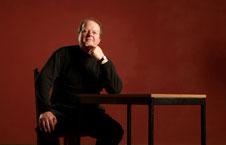
Pro-Vice-Chancellor (Sciences) Professor Keith Hunter
A leading Otago marine chemist will travel to New York later this month for the announcement of the winners of a $2 million global competition to develop breakthrough ocean pH sensor technologies.
Pro-Vice-Chancellor (Sciences) Professor Keith Hunter is the only non-US judge in the Wendy Schmidt Ocean Health XPRIZE competition.
This competition challenged teams of engineers, scientists and innovators from all over the world to create pH sensor technology that affordably, accurately and efficiently measures ocean acidification.
Ocean acidification has been described as 'climate change's evil twin'. The absorption of human CO2 emissions is already having a profound impact on ocean chemistry, threatening the health of shellfish, fisheries, coral reefs and other ecosystems.
Professor Hunter says it is important to have reliable pH sensors to assess the magnitude and rate of ocean acidification in different regions.
“This is especially true in coastal waters where the effects can be quite variable,” he says.
Professor Hunter was invited to be one of the five judges by the XPRIZE Foundation because of his ocean pH measurement expertise and on the advice of the Science Advisory Board that was established for this prize.
The competition ran in four stages, each of which involved measuring the performance of the devices against a recognised standard method. In May, five finalist teams representing four countries embarked on a week-long deep sea trial off Hawaii.
Professor Hunter and his four fellow judges used the data to monitor accuracy, precision and ease of use. They also considered the costs of each device. Scores awarded for each measure were aggregated to arrive at the final placings.
The final face-to-face meeting of the judges held earlier in July in Los Angeles involved much discussion about the meaning and validity of the data. Professor Hunter contributed to earlier meetings of the judges by teleconference.
Professor Hunter says this was a very exciting experience for him, particularly through learning about the broader work of the XPRIZE Foundation.
“It was an honour to be chosen as a judge in such a competition.”
He says it is extremely likely that New Zealand researchers, including Otago scientists, will end up using the winning technologies in the near future.
The competition was the first in a more general campaign around ocean health in general, the aim of which is to sponsor the development of a range of reliable sensors for monitoring various aspects of ocean health.